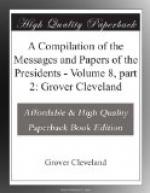I. That it is merely an application of a principle comprised in the preceding articles is declared by the express words of the article, to wit: “Dans l’exemption ci-dessus est nommement compris,” etc., “in the above exemption is particularly comprised, the imposition of 100 sols per ton established in France on foreign vessels.” Here, then, is at once an express declaration that the exemption from the duty of 100 sols is comprised in the third and fourth articles; that is to say, it was one of the exemptions enjoyed by the most favored nations, and as such extended to us by those articles. If the exemption spoken of in this first member of the fifth article was comprised in the third and fourth articles, as is expressly declared, then the reservation by France out of that exemption (which makes the second member of the same article) was also comprised; that is to say, if the whole was comprised, the part was comprised. And if this reservation of France in the second member was comprised in the third and fourth articles, then the counter reservation by the United States (which constitutes the third and last member of the same article) was also comprised, because it is but a corresponding portion of a similar whole on our part, which had been comprised by the same terms with theirs.
In short, the whole article relates to a particular duty of 100 sols, laid by some antecedent law of France on the vessels of foreign nations, relinquished as to the most favored, and consequently to us. It is not a new and additional stipulation, then, but a declared application of the stipulations comprised in the preceding articles to a particular case by way of greater caution.
The doctrine laid down generally in the third and fourth articles, and exemplified specially in the fifth, amounts to this: “The vessels of the most favored nations coming from foreign ports are exempted from the duty of 100 sols; therefore you are exempted from it by the third and fourth articles. The vessels of the most favored nations coming coastwise pay that duty; therefore you are to pay it by the third and fourth articles. We shall not think it unfriendly in you to lay a like duty on coasters, because it will be no more than we have done ourselves. You are free also to lay that or any other duty on vessels coming from foreign ports, provided they apply to all other nations, even the most favored. We are free to do the same under the same restriction. Our exempting you from a duty which the most favored nations do not pay does not exempt you from one which they do pay.”
In this view, it is evident that the fifth article neither enlarges nor abridges the stipulations of the third and fourth. The effect of the treaty would have been precisely the same had it been omitted altogether; consequently it may be truly said that the reservation by the United States in this article is completely useless. And it may be added with equal truth that the equivalent reservation by France is completely useless, as well as her previous abandonment of the same duty, and, in short, the whole article. Each party, then, remains free to raise or lower its tonnage, provided the change operates on all nations, even the most favored.




